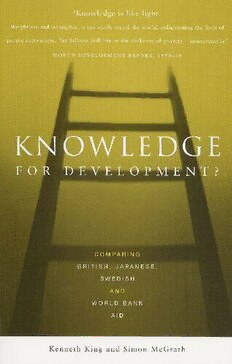
Knowledge for development?: Comparing British, Japanese, Swedish and World Bank aid PDF
251 Pages·2004·1.097 MB·English
Most books are stored in the elastic cloud where traffic is expensive. For this reason, we have a limit on daily download.
Preview Knowledge for development?: Comparing British, Japanese, Swedish and World Bank aid
Description:
In 1996, the World Bank President, James Wolfensohn, declared that his organization would henceforth be ‘the knowledge bank’. This marked the beginning of a new discourse of knowledge-based aid, which has spread rapidly across the development field. This book is the first detailed attempt to analyse this new discourse.Through an examination of four agencies –– the World Bank, the British Department for International Development, the Japan International Cooperation Agency and the Swedish International Development Cooperation Agency –– the book explores what this new approach to aid means in both theory and practice. It concludes that too much emphasis has been on developing capacity within agencies rather than addressing the expressed needs of Southern ‘partners’. It also questions whether knowledge-based aid leads to greater agency certainty about what constitutes good development.
See more
The list of books you might like
Most books are stored in the elastic cloud where traffic is expensive. For this reason, we have a limit on daily download.
